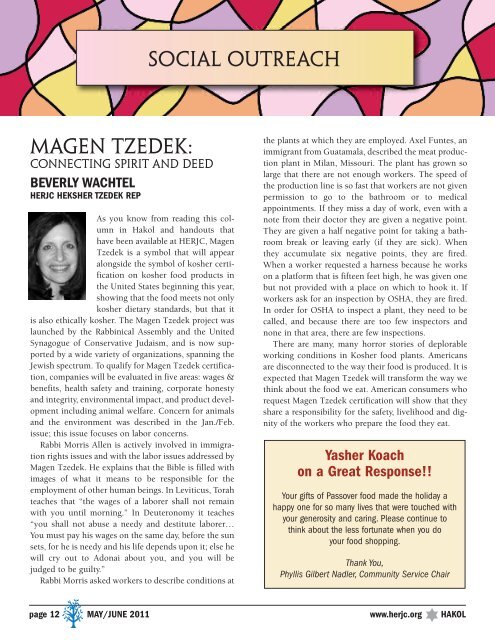Laurie & Joe Brofsky - Hewlett E. Rockaway Jewish Center
Laurie & Joe Brofsky - Hewlett E. Rockaway Jewish Center
Laurie & Joe Brofsky - Hewlett E. Rockaway Jewish Center
You also want an ePaper? Increase the reach of your titles
YUMPU automatically turns print PDFs into web optimized ePapers that Google loves.
social outreach<br />
magen tzedek:<br />
connecting spirit and deed<br />
BEVERLY WACHTEL<br />
HERJC HEKSHER TZEDEK REP<br />
As you know from reading this column<br />
in Hakol and handouts that<br />
have been available at HERJC, Magen<br />
Tzedek is a symbol that will appear<br />
alongside the symbol of kosher certification<br />
on kosher food products in<br />
the United States beginning this year,<br />
showing that the food meets not only<br />
kosher dietary standards, but that it<br />
is also ethically kosher. The Magen Tzedek project was<br />
launched by the Rabbinical Assembly and the United<br />
Synagogue of Conservative Judaism, and is now supported<br />
by a wide variety of organizations, spanning the<br />
<strong>Jewish</strong> spectrum. To qualify for Magen Tzedek certification,<br />
companies will be evaluated in five areas: wages &<br />
benefits, health safety and training, corporate honesty<br />
and integrity, environmental impact, and product development<br />
including animal welfare. Concern for animals<br />
and the environment was described in the Jan./Feb.<br />
issue; this issue focuses on labor concerns.<br />
Rabbi Morris Allen is actively involved in immigration<br />
rights issues and with the labor issues addressed by<br />
Magen Tzedek. He explains that the Bible is filled with<br />
images of what it means to be responsible for the<br />
employment of other human beings. In Leviticus, Torah<br />
teaches that “the wages of a laborer shall not remain<br />
with you until morning.” In Deuteronomy it teaches<br />
“you shall not abuse a needy and destitute laborer…<br />
You must pay his wages on the same day, before the sun<br />
sets, for he is needy and his life depends upon it; else he<br />
will cry out to Adonai about you, and you will be<br />
judged to be guilty.”<br />
Rabbi Morris asked workers to describe conditions at<br />
the plants at which they are employed. Axel Funtes, an<br />
immigrant from Guatamala, described the meat production<br />
plant in Milan, Missouri. The plant has grown so<br />
large that there are not enough workers. The speed of<br />
the production line is so fast that workers are not given<br />
permission to go to the bathroom or to medical<br />
appointments. If they miss a day of work, even with a<br />
note from their doctor they are given a negative point.<br />
They are given a half negative point for taking a bathroom<br />
break or leaving early (if they are sick). When<br />
they accumulate six negative points, they are fired.<br />
When a worker requested a harness because he works<br />
on a platform that is fifteen feet high, he was given one<br />
but not provided with a place on which to hook it. If<br />
workers ask for an inspection by OSHA, they are fired.<br />
In order for OSHA to inspect a plant, they need to be<br />
called, and because there are too few inspectors and<br />
none in that area, there are few inspections.<br />
There are many, many horror stories of deplorable<br />
working conditions in Kosher food plants. Americans<br />
are disconnected to the way their food is produced. It is<br />
expected that Magen Tzedek will transform the way we<br />
think about the food we eat. American consumers who<br />
request Magen Tzedek certification will show that they<br />
share a responsibility for the safety, livelihood and dignity<br />
of the workers who prepare the food they eat.<br />
Yasher Koach<br />
on a Great Response!!<br />
Your gifts of Passover food made the holiday a<br />
happy one for so many lives that were touched with<br />
your generosity and caring. Please continue to<br />
think about the less fortunate when you do<br />
your food shopping.<br />
Thank You,<br />
Phyllis Gilbert Nadler, Community Service Chair<br />
page 12 MAY/JUNE 2011 www.herjc.org HAKOL
















